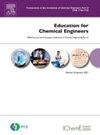Online preparation for enhanced practice, confidence and learning, in chemical engineering experimental laboratories
IF 2.3
2区 教育学
Q1 EDUCATION, SCIENTIFIC DISCIPLINES
引用次数: 0
Abstract
Experimentation and/or learning by doing, where students apply and secure concepts gained in other concurrent courses, are an essential intrinsic component to any engineering discipline in higher education. Moreover, practical skills in chemical engineering are important for the formation and development of our students as well as being within the (Institution of Chemical Engineers) IChemE accreditation requirements. To cope with the restricted access to the university laboratories at the University of Edinburgh (UoE) during the academic year 2020–21 (AY20/21) caused by the COVID-19 lockdown, the different Chemical Engineering courses with laboratory components at the UoE made use of a wide range of digital tools including videos, quizzes, assignments, etc. to provide the necessary and relevant learning environment and ensure students could follow the different experimentations online as if they were in the lab. The quality and quantity of digital material and resources created motivated a subsequent development of a detailed step-by-step interactive online preparation experience prior to current in-person laboratory sessions. During this online preparation, students are guided through the introduction, experimental apparatus, risk assessment, start-up and shut-down via videos and videos embedded with quizzes, interactive activities such as fill in the blank and mix and match, as well as assignment submissions. The aims of the online preparation are three-fold: 1. provide the students with a more engaging and interactive mode of deepening their understanding on the experiment to be tackled; 2. furnish the student with a higher level of confidence and preparation prior the actual in-person experimentation; and 3. ensure students prepare and submit the necessary risk assessment before the laboratory session as expected by the IChemE. Overall, an enhancement in the students’ satisfaction when compared to other traditional preparation modes, such as making use of the laboratory manual, is reported. In particular, a 140 % increase in the confidence and practice are highlighted with an 80 % improvement in securing fundamentals, when compared to no preparation or the sole use of the laboratory manual. The better confidence and understanding prior to the laboratory session also played a role on the enjoyable and rewarding of such hands-on experimentation with the consequent better practical preparation of future professional engineers.
在线准备提高实践,信心和学习,在化学工程实验实验室
实验和/或边做边学,学生应用和巩固在其他并行课程中获得的概念,是高等教育中任何工程学科必不可少的固有组成部分。此外,化学工程方面的实践技能对于学生的形成和发展非常重要,并且符合(化学工程师学会)IChemE认证要求。为了应对2020-21学年(AY20/21)因新冠肺炎疫情封锁而限制进入爱丁堡大学(UoE)大学实验室的问题,UoE不同的化学工程课程使用了广泛的数字工具,包括视频、测验、作业、等,提供必要和相关的学习环境,确保学生可以像在实验室一样在线跟踪不同的实验。创建的数字材料和资源的质量和数量激发了在当前的亲自实验室会议之前详细的一步一步交互式在线准备体验的后续开发。在这个在线准备过程中,通过视频和嵌入测验的视频,填空和混搭等互动活动,以及提交作业,指导学生完成介绍、实验设备、风险评估、启动和关闭。在线准备的目的有三个方面:1。为学生提供一个更具参与性和互动性的模式,加深他们对所要解决的实验的理解;2. 在实际的亲身实验之前,为学生提供更高水平的信心和准备;和3。确保学生按照IChemE的要求在实验前准备并提交必要的风险评估。总体而言,与其他传统的准备模式(如使用实验室手册)相比,学生的满意度有所提高。特别是,与不准备或单独使用实验室手册相比,在信心和实践方面提高了140% %,在确保基础方面提高了80% %。在实验之前,更好的信心和理解也对这种动手实验的乐趣和回报起到了作用,从而为未来的专业工程师提供了更好的实践准备。
本文章由计算机程序翻译,如有差异,请以英文原文为准。
求助全文
约1分钟内获得全文
求助全文
来源期刊

Education for Chemical Engineers
Multiple-
CiteScore
8.80
自引率
17.90%
发文量
30
审稿时长
31 days
期刊介绍:
Education for Chemical Engineers was launched in 2006 with a remit to publisheducation research papers, resource reviews and teaching and learning notes. ECE is targeted at chemical engineering academics and educators, discussing the ongoingchanges and development in chemical engineering education. This international title publishes papers from around the world, creating a global network of chemical engineering academics. Papers demonstrating how educational research results can be applied to chemical engineering education are particularly welcome, as are the accounts of research work that brings new perspectives to established principles, highlighting unsolved problems or indicating direction for future research relevant to chemical engineering education. Core topic areas: -Assessment- Accreditation- Curriculum development and transformation- Design- Diversity- Distance education-- E-learning Entrepreneurship programs- Industry-academic linkages- Benchmarking- Lifelong learning- Multidisciplinary programs- Outreach from kindergarten to high school programs- Student recruitment and retention and transition programs- New technology- Problem-based learning- Social responsibility and professionalism- Teamwork- Web-based learning
 求助内容:
求助内容: 应助结果提醒方式:
应助结果提醒方式:


